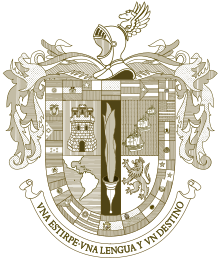Asociación de Academias de la Lengua Española
 |
|

Countries where Spanish-language academies exist.
|
|
| Abbreviation | ASALE |
|---|---|
| Motto | "Una estirpe, una lengua y un destino" ("One lineage, one language, and one destiny") |
| Formation | 1951 |
| Headquarters | Madrid, Spain |
|
Official language
|
Spanish |
|
President
|
José Manuel Blecua |
|
Main organ
|
International Congress |
| Website | www |
The Association of Spanish Language Academies (Spanish: Asociación de Academias de la Lengua Española) is the entity which regulates the Spanish language. It was created in Mexico in 1951 and represents the union of all the separate academies in the Spanish-speaking world.
Through the initiative of then-president of Mexico Miguel Alemán Valdés, the First Congress of Academies convened with the purpose of maintaining the integrity of and fostering the further growth of Spanish. The meeting was held from April 23 to May 6, 1951 and resulted in the creation of the association and its permanent commission. The Real Academia Española (RAE) was not present at the initial meeting but participated in the Permanent Commission. Ever since the Second Congress convened in 1956, the RAE has been a regular participant.
The collaboration between RAE and the other academies was expressed in the coauthorship of the Diccionario de la RAE (starting from the 22nd edition, published in 2001), and the 1999 edition of the Ortografía was considered a true pan-Hispanic work. Joint projects include the editing of the Gramática and the compilation of the Diccionario de americanismos. In 2000 the Association organized the School of Hispanic Lexicography and the Carolina Foundation to promote Spanish lexicography.
Together with the RAE, the Association earned the Prince of Asturias Award for Peace in 2000.
An academy for Equatorial Guinea was created in 2013 and joined to the Association in 2016, while an academy for Judaeo-Spanish was founded the following year. There are no plans for Belize, Gibraltar, or Andorra to have their own academies, despite each having a majority Spanish-speaking population either as a first or second language. There is also a substantial Spanish population in Brazil and Western Sahara.
...
Wikipedia
